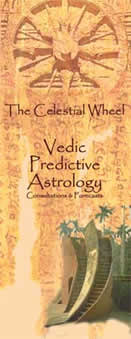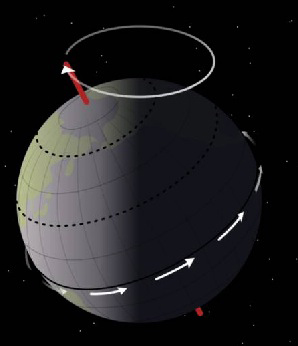 |
The Celestial Wheel Astrology's Zodiac Is Debunked
January 16, 2011
|
Astrology's Zodiac Is Debunked
The January 11 Vedicleaks entry (password required) discussed the final challenging disposition in the December and January Mars/Rahu conjunction, The last sensitive date is this coming Friday, when forward moving Mercury crashes into backwards moving Rahu. This unnerves Mercury's nervous system and communications, an influence for feeling under attack. To be accurate, this stressful interval should have been called the Mars/Rahu/Mercury conjunction -- for Mercury being in the midst of Mars/Rahu.
There's been lots going on in the world, perhaps most notably the fall of governments in Lebanon and Tunisia and 102 pilgrims killed in stampede at Indian festival. Extreme weather continues as well -- the Australia flood continues and Brazil was also hit by a flood.
Let's hope the world begins to calm now -- or to put it another way, let's hope Vedic Astrology's The Celestial Wheel is correct. After all, by now, everyone knows about the media buzz that the astrology zodiac is wrong.
This January 11with FOX News article, Age of Aquarius Actually Age of Capricorn, Thanks to Rotation of the Earth, first raised the issue, as though it were new information and startling news. Adding to the confusion/concern is the mention of the thirteenth sign, Ophuchicus.
Other media stories followed, some defending and explaining, but not clarifying the issue. See: CBS Why the New Zodiac Changes Nothing, New York Times Did Your Horoscope Predict This? Washington Post New Zodiac sign dates: Don't switch horoscopes yet. This is a classic case of a news item going viral with no one slowing down to check the facts. Well, it sure fits with the Mercury/Rahu conjunction.
The issue is that the earth has a small and slow wobble in its orientation to the heavens -- one degree every seventy years. This, called precession, has pushed the zodiac ahead now twenty four degrees of the actual positions of the stars, and thereby the signs (constellations), for those are made of stars.
This article, Axial precession (astronomy, explains,
| In astronomy, axial precession is a gravity-induced, slow and continuous change in the orientation of an astronomical body's rotational axis. In particular, it refers to the gradual shift in the orientation of Earth's axis of rotation, which, like a wobbling top, traces out a cone in a cycle of approximately 26,000 years (called a Great or Platonic Year in astrology). |
As a picture is worth a thousand words, this drawing from the article shows precession, distinguishing it from the earth's 24 hour rotation. So, while the earth rotates daily in its year-long journey around the Sun, it also rotates very slowly on its axis.
 |
The issue began when Ptolomy, a Greek at the library in Alexandria, decided to set the beginning of the first zodiac sign, Aries, to the spring equinox. In that age of hunting and agriculture, it was vital to know when the seasons began to understand when animals migrated, when to plant crops, when to harvest.... Using this tropical (seasonal) zodiac made simple sense. It created an observable calendar in the sky. Doesn't this also jive with the constellations being mostly animal symbols? Ptolomy knew of precession, which is also naturally called precession of the equinoxes. The ancient East Indians did not adopt this view and have continued to use the sidereal -- star based -- zodiac.
For centuries, this didn't cause a problem because the two zodiacs diverge very slowly -- one degree every seventy years. Later when the Roman Empire fell and the dark ages began, the knowledge of precession was lost. No one knew to check whether the Western Tropical Zodiac was still accurate or disconnected from the heavens. See Sidereal astrology, which cogently states the issue,
| The difference between sidereal and tropical astrology is in the opinion whether the system as defined by Ptolemy in the 2nd century should be fixed to the seasons, i.e. the orientation of the Earth relative to the solar system, or to the background stars, i.e. the orientation of the Earth relative to the galaxy. Tropical astrology chooses the former, sidereal astrology the latter option. Both systems coincide for times close to the historical definition of the Zodiac. |
The Catholic Church, finding as most churches do, that astrology competed for their believers, burned the astrology books in Europe -- and probably a lot of astrologers. Another issue is medieval scientists also believed in alchemy and astrology. With alchemy gradually debunked because it didn't work, astrology naturally followed. (Note: Hinduism does not have a conflict with astrology because their Vedic Astrology, called Jyoitish, is integral to their religion/culture.)
By the nineteenth century, Western Tropical Astrology had vanished. Folks in the latter part of that century then began to gather together the bits and pieces of remaining astrology books and consulted with both Arabs and Indians to reinvent Western Astrology. As psychology was emerging then, folks like Sigmond Frued and Carl Jung, both interested in astrology, stamped the reinvented system as a psychological model. The library at the American College of Vedic Astrology holds a letter from Jung to the great Indian astrologer, B.V. Raman, inquiring about astrology, explaining he employed it in his work with patients. A simple way to verify this reinvention of Western Tropical Astrology is to search for a Western Astrology book written before 1870. There aren't any.
In the meantime, modern astronomy rediscovered precession, again in the nineteenth century, but curiously, the astrologers didn't look up from their charts. If they had, they would have seen their Tropical Zodiac was then 23 degrees (24 now) advanced beyond the astronomical positions of the stars -- and hence the constellations (signs) which are made of stars. It wasn't until about 1920 that the connection was made, and by then modern Tropical Astrology was firmly entrenched in the West. That must have been a shocker to Western Astrologers!
When I first began studying astrology under James Braha in 1996, he asked me to read some Western Tropical texts as well. After all, even this pioneer author in bringing Eastern Vedic Astrology to the West was first a Western Astrologer. One never completely gives up ones native tongue. I didn't care for this psychological model astrology, as it seemed to be just that, not an events and circumstances predictive craft, which Vedic Astrology offered -- because it placed the planets where they actually are in the sky. Western Astrology's disconnection from the heavens made it wrong on its face. How can a planet be in two different places? In the old shell game, the pea can only be under only one shell, and the Western Tropical Astrology will always be wrong by nearly one entire 30 degree sign -- believing the pea to be under the wrong shell.
 |
I acknowledge, however, that Western Tropical Astrology has value in its psychology because its primary tool is aspects -- the relationships the planets have to each other, which don't change with the starting point of the zodiac. Similarly, it doesn't matter where an auto race starts with regard to how the cars are aligned at the finish. But it's also true you can't measure an American football field with a meter stick.
Western Astrologers don't dispute this history, nor the fact that their astrology is a psychological one, not predictive. Still, as people naturally visit astrologers to learn their future, Western Astrologers respond, with a psychological orientation. Well, don't other counselors do the same? Visit a physician, and he'll give you a treatment of some kind, even if he doesn't really know what's wrong with you. Does this add to the confusion? Yup. Consider too that nearly all the early Vedic astrologers in the West studied Western Tropical first -- it's their native tongue. Since then, Western converts to Vedic Astrology have the same issue. Some even call themselves Neo-Vedic Astrologers -- meaning New Vedic. Frankly, I would not be so bold as to change this truly ancient astrology, empirically tested for millennia by astrologers in India's enduring society, who, by the way, can still today read original Sanskrit texts.
Will this issue ever be settled? Probably not. Belief systems, whether astrological, religious, social or political, don't easily yield. So, if you look up one night to see the Moon passing through easily recognized Gemini, and a Western astrologer had explained earlier that day how the Moon in Cancer then was affecting you, don't call him suggesting he look up. Even if he see it, he won't believe it. Or he'll explain the problem results from the signs being different sizes, or some other issue to justify this basic calculation error. But know this -- he nearly always loses in the shell game! He may be adept at liar's poker though.
I will close here with one particularly prickly issue -- the Sun Sign. Western Astrology uses ten planets. Relying upon your Sun's sign -- ignoring the other nine planets -- is like going into a store to buy a new shirt but not defining the size, fabric, style, cost.... Of course, if you're a Libra, you'll make a well balanced choice. ![]()
(Note: In comparison, India's Vedic Astrology relies on the rising sign -- the sign (constellation) that was coming up over the horizon at birth, and which establishes the first house of the self -- and thereby the house positions of all the planets. As the earth completes a full rotation in 24 hours, all 12 signs rise above the horizon during that interval - 1 every 2 hours. This is very specific, explaining, for example, why people born on the same day at differing times are very dissimilar.
PS Don't sweat the new sign Ophuchicus. It was discarded over two thousand years ago, and no one has missed it until FOX News made that claim.
Copyright
1999-2010 |
